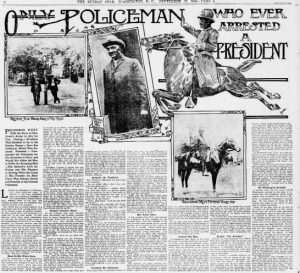Civil War Surprises: NOT the First! Not! Not! Not!
Much of the recent national news has concerned itself with features relating to former President Trump’s appearance in a New York City courtroom. The talking heads keep telling viewers that Trump was the “FIRST president of the United States to get dragged into court” over something.
“Yeah, yeah,” I thought, “Same old, ” until one reporter mentioned that Trump was not the first American President with legal issues. The actual first was President Ulysses S. Grant!
In 1872, President Ulysses S. Grant drove his carriage through Georgetown in an area patrolled by Officer William H. West, a former soldier in an all-black regiment during the Civil War. Officer West joined the Washington police in 1871. His lieutenant detailed him, among others, to keep a special watch on the areas in the “aristocratic” part of the city, specifically the area around 13th and M Street in the northwest district. West was also detailed to keep his eye on carriages entering and leaving a racetrack in Brightwood. Having a lovely carriage and a swift set of horses to pull it was one of many ways for Washington “swells” to show off their equipage and driving prowess, sometimes creating accidents and injuries to pedestrians and drivers alike. A little community policing in specific areas might help matters.
Most readers of ECW know that Ulysses S. Grant loved horses and had no qualms about riding fast or dangerously. As President of the United States, one would think Grant might have been more cautious, but no…this is “Turn South Grant” we speak of here. Not until 1901 did a President have a chauffeur–William McKinley, and then only briefly. It took another forty years before any President regularly used a specially armored car. President Franklin Roosevelt had an early version of what is now called the “Beast,” which once belonged to Al Capone!

But even Grant, a Civil War hero and current President of the United States, found he was not above the law. In 1872, President Grant was pulled over for speeding with his horse-drawn carriage in the capital. This was not an impeachable offense, but Grant still faced consequences. Officer West stopped the vehicle at the corner of 13th and M streets. West gave the President a verbal warning:
I want to inform you, Mr. President, that you are violating the law by speeding along this street. Your fast driving, sir, has set the example for a lot of other gentlemen. [i]
I cannot vouch for the authenticity of the quote, however. There were no early body cam videos for verification.
Grant said he was sorry and promised it would no longer be an issue, but the next day, Officer West, this time working Georgetown, saw the President speeding again. This time the President was racing, and it took West an entire city block to stop Grant’s carriage. West claimed to have told Grant:
I cautioned you yesterday, Mr. President, about fast driving, and you said, sir, that it would not occur again,” I am very sorry, Mr. President, to have to do it, for you are the chief of the nation, and I am nothing but a policeman, but duty is duty, sir, and I will have to place you under arrest. [ii]
Grant’s alleged response this time was another apology, explaining that it was difficult to “hold his team down to the regulation speed.”
Hang it, officer. These animals of mine are thoroughbreds, and there is no holding them. [iii]
Grant and several other fast drivers were taken to the local station. At that time, Grant paid $20.00 in bail. He then watched in amusement as his six companions, some of them prominent government officials, protested their arrests on a similar speeding charge. They were ordered to appear in court the next day, but Grant failed to show up, thus forfeiting his bail money. The trial was contentious, and the drivers were ordered to pay heavy fines. An appeal upheld the original verdict, and a related attempt to charge Officer West with “excess accountability” was thrown out of court. President Grant had intervened, making it clear that West was to be commended for his fearlessness in making arrests and that no harm was to come to West’s employment. [iv]
So, as the title says, President Trump is NOT the first president to be arrested. I am hoping, however, that he will be the last.

_______________________________________________
[i] Washington Evening Star, “Only Policeman Who Ever Arrested a President.” September 27, 1908, and https://www.smithsonianmag.com/smart-news/when-president-ulysses-s-grant-was-arrested-for-speeding-in-a-horse-drawn-carriage-180981916/.
[ii] Ibid.
[iii] https://www.smithsonianmag.com/smart-news/when-president-ulysses-s-grant-was-arrested-for-speeding-in-a-horse-drawn-carriage-180981916/
[iv] Ibid.

Talking surprise! How about history that is stranger than fiction! December 1941 the Japanese have just bombed Pearl Harbor and President Roosevelt has to ride up to Capitol Hill and address the Congress. The Secret Service is worried the President will be attacked in route. Problem is they don’t have an armored car to transport the President in. With limited time and money the task seems impossible. This is where history gets strange, luckily a Secret Service Agent remembers seeing an armored vehicle in the Treasury Impound Lot! President Roosevelt is driving to the US Capitol to gives one of his most famous speech (- a date which will live in infamy-) in one of the most famous gangster’s car of the 20th century! The car in your picture, Al Capone’s armored 1928 Cadillac Town Sedan that was seized for tax evasion!
You gotta love it!
Grant is not only the first president to be arrested, he is probably the last. Current Department of Justice policy is that an incumbent president cannot be arrested. The only remedy is impeachment, followed by arrest.